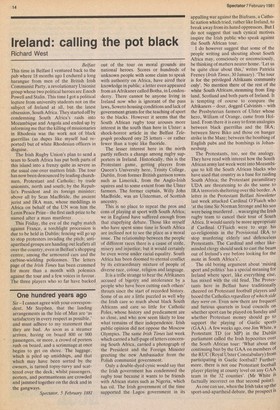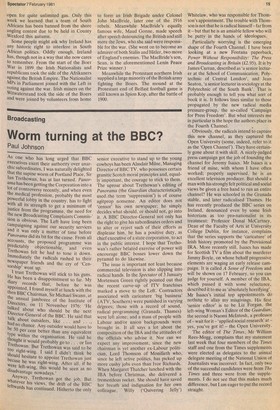Ireland: calling the pot black
Richard West
Belfast This time in Belfast I ventured back to the pub where 18 months ago I endured a long harangue from men of the British Irish Communist Party, a revolutionary Unionist group whose two political heroes are Enoch Powell and Stalin. This time I got a political lecture from university students not on the subject of Ireland at all, but the latest obsession, South Africa. They started off by condemning South Africa's raids into Mozambique and Angola and ended up by informing me that the killing of missionaries in Rhodesia was the work not of black guerrillas (as dupes like myself had reported) but of white Rhodesian officers in disguise.
The Irish Rugby Union's plan to send a team to South Africa has put both parts of this island into a frenzy quite as severe as the usual one over matters Irish. The tour has now been denounced by leading churchmen, Protestant and Catholic; by trade unionists, north and south; by the Republic's President and its foreign minister; above all by Sean MacBride, the ancient jurist and IRA man, whose meddlings in Africa on behalf of the UN won him the Lenin Peace Prize — the first such prize to be named after a mass murderer.
This Friday, the eve of the rugby match against France, a torchlight procession is due to be held in Dublin; fencing will go up to stop protesters invading the pitch; antiapartheid groups are handing out leaflets all over the country, even in Belfast's shopping centre, among the armoured cars and the carbine-wielding policemen. The letters page of the Irish Times has been crammed for more than a month with polemics against the tour and a few voices in favour. The three players who so far have backed out of the tour on moral grounds are national heroes. Scores or hundreds of unknown people with some claim to speak with authority on Africa, have aired their knowledge in public; a letter even appeared from an Afrikaner called Botha, in London derry. There cannot be anyone living in Ireland now who is ignorant of the pass laws, Soweto housing conditions and lack of government grants for the teaching of sport to the blacks. However it seems that the South African rugby tour arouses more , interest in the south than here in Ulster: a shock-horror article in the Belfast Telegraph produced ony 25 letters — or rather fewer than a topic like fluoride.
The lesser interest here in the north partly reflects a change among rugby sup porters in Ireland. Historically, this is the Protestant game, getting players from Queen's University here, Trinity College, Dublin, from former British garrison towns such as Limerick, from the Anglo-Irish squires and to some extent from the Ulster farmers. The former captain, Willy John MacBride, was an Ulsterman, of Scottish ancestry.
This is no place to repeat the pros and cons of playing at sport with South Africa; we in England have suffered enough from that stupefying debate. Those like myself who have spent some time in South Africa are inclined not to see the place as a moral issue. The relationship between the people of different races there is a cause of strife, misery and injustice; but it would certainly be even worse under racial equality. South Africa has been doomed to eternal conflict by its extraordinary mixture of people of diverse race, colour, religion and language.
It is a trifle strange to hear the Afrikaners accused of bigotry and intolerance by a people who have been cutting each others' throats since the start of recorded history. Some of us are a little puzzled as well why the Irish care so much about black South Africans and care so little for Catholic Poles, whose history and predicament are so close, and who now seem likely to lose what remains of their independence. Irish public opinion did not oppose the Moscow Olympics. The same Irish Times last week which carried a half-page of letters concerning South Africa, carried a photograph of the President and the Foreign Minister greeting the new Ambassador from the Polish communist government.
Only a double-dyed cynic would say that the Irish government has condemned the rugby tour because it wants to be friends with African states such as Nigeria, which has oil. The Irish government of the time supported the Lagos government in its appalling war against the Biafrans, a Catholic nation which tried, rather like Ireland, to break away from its hated oppressors. But I do not suggest that such cynical motives, inspire the Irish public who speak against the South African tour.
I do however suggest that some of the people writing and shouting about South Africa may, consciously or unconsciously, be thinking of matters nearer home. 'Let us be quite clear about this,' writes Patricia Feeney (Irish Times, 30 January). `The tour is for the privileged Afrikaans community only'. No mention there of the rest of the white South Africans, stemming from England, Scotland and both parts of Ireland. It is tempting of course to compare the Afrikaners — dour, dogged Calvinists — with the Presbyterian farmers of Ulster whose hero, William of Orange, came from Holland. From there it is easy to form analogies between black guerrillas and the IRA; between Steve Biko and those on hunger strike in the Maze; between the bombing of English pubs and the bombings in Johannesburg.
The Protestants, too, see the analogy. They have read with interest how the South African army last week went into Mozambique to kill the South African blacks who have used that country as a base for raiding South Africa; the Protestant paramilitary UDA are threatening to do the same to IRA terrorists sheltering over the border. A letter in the Protestant Belfast Newsletter last week attacked Cardinal O'Fiaich who `at the time Sir Norman Stronge and his son were being murdered. . was urging the Irish rugby team to cancel their tour of South Africa. It would surely be more appropriate if Cardinal O'Fiaich were to urge his co-religionists in the Provisional IRA to stop murdering elderly and defenceless Protestants. The Cardinal and other likeminded clergy should seek to cast the beam out of Ireland's eye before looking for the mote in South Africa's'.
The old boring argument about 'mixing sport and politics' has a special meaning for Ireland where sport, like everything else, has mixed with the old feud. The Protestants here in Belfast have traditionally cheered on Protestant football players and booed the Catholics regardless of which side they were on. Even now there are frequent and furious quarrels in local councils on whether sport can be played on Sunday and whether Protestant money should go to support the playing of Gaelic sports (GAA). A few weeks ago, one Jim White, a Protestant TD (or MP) in the Dublin parliament called the Irish hypocrites over the South African tour: 'What about the continuing ban by the GAA on members of the RUC (Royal Ulster Constabulary) from participating in Gaelic football? Furthermore, there is not one Protestant football player playing at county level on any GAA team in the 32 counties'. (Mr White Is factually incorrect on that second point) As one can see, when the Irish take up the sport-and-apartheid debate, the prospect is open for quite unlimited gas. Only this week we learned that a team of South Africans has been banned from the shore angling contest due to be held in County Wexford this autumn.
Some people might ask why Ireland has any historic right to interfere in South African politics. Oddly enough, Ireland has, though not in a way that she now cares to remember. From the start of the Boer War in 1899, the Irish Nationalists and republicans took the side of the Afrikaners against the British Empire. The Nationalist MPs in Parliament joined with the Left in voting against the war. Irish miners on the Witwatersrand took the side of the Boers and were joined by volunteers from home to form an Irish Brigade under Colonel John MacBride, later one of the 1916 rebels. Meanwhile MacBride's equally famous wife, Maud Gonne, made speech after speech denouncing the British and still more the Jews, who she said were responsible for the war. (She went on to become an admirer of both Stalin and Hitler, two more of England's enemies. The MacBride's son, Sean, is the aforementioned Lenin Peace Prize winner.) Meanwhile the Protestant northern Irish supplied a large minority of the British army fighting the Boers. The mound at the Protestant end of Belfast football game is still known as Spion Kop, after the battle of 1900.







































 Previous page
Previous page